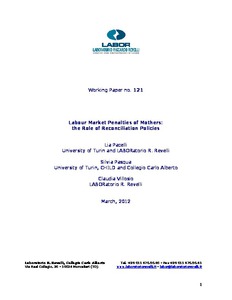Labour market penalties of mothers: the role of reconciliation policies
"A key issue in increasing women’s participation in productive activities is the possibility of achieving a high work-life balance, both in terms of personal wellbeing and in terms of fair career prospects. The crucial event that challenges any level of work-life balance working women achieve i...
| Main Authors: | , , |
|---|---|
| Institution: | ETUI-European Trade Union Institute |
| Format: | TEXT |
| Language: | English |
| Published: |
Turin
2012
LABOR |
| Subjects: | |
| Online Access: | https://www.labourline.org/KENTIKA-19135277124919534599-Labour-market-penalties-of-mot.htm |
| Summary: | "A key issue in increasing women’s participation in productive activities is the possibility of achieving a high work-life balance, both in terms of personal wellbeing and in terms of fair career prospects. The crucial event that challenges any level of work-life balance working women achieve is motherhood. We analyse how motherhood affects women's working career, both in terms of participation and in terms of wages, compared to “non-mothers”. The country chosen for the analysis is Italy, a paradigmatic example of low participation rate, scant childcare, high wage inequality and a cultural environment that considers childcare a predominantly “female affair”. While most of the literature focuses either on wages or on participation, we consider both dimensions in a country where female participation is low, thus contributing to filling the gap in the literature of studies of this kind referred to southern European countries. We confirm that the probability of leaving employment significantly increases for new mothers (career-break job penalty); however, this is mitigated by higher job quality and human capital endowment, and by childcare accessibility. Crucially, the availability of part-time jobs reduces the probability of mothers moving out of the labour force. Furthermore, women not leaving employment after becoming mothers face a decrease in wage levels and growth compared to non-mothers, and there are no signs of this gap closing five years after childbirth (family wage gap). Again, part-time employment plays a crucial role, as the family wage gap penalty emerges only among women working full-time both before and after childbirth; a part-time job over the whole period or even only after childbirth prevents any wage gap from opening up between such working mothers and non-mothers.
A decisive fact in this context is that in Italy part-time jobs are (scant but) well paid and protected, unlike most other countries." |
|---|---|
| Physical Description: | 34 p. Digital |

